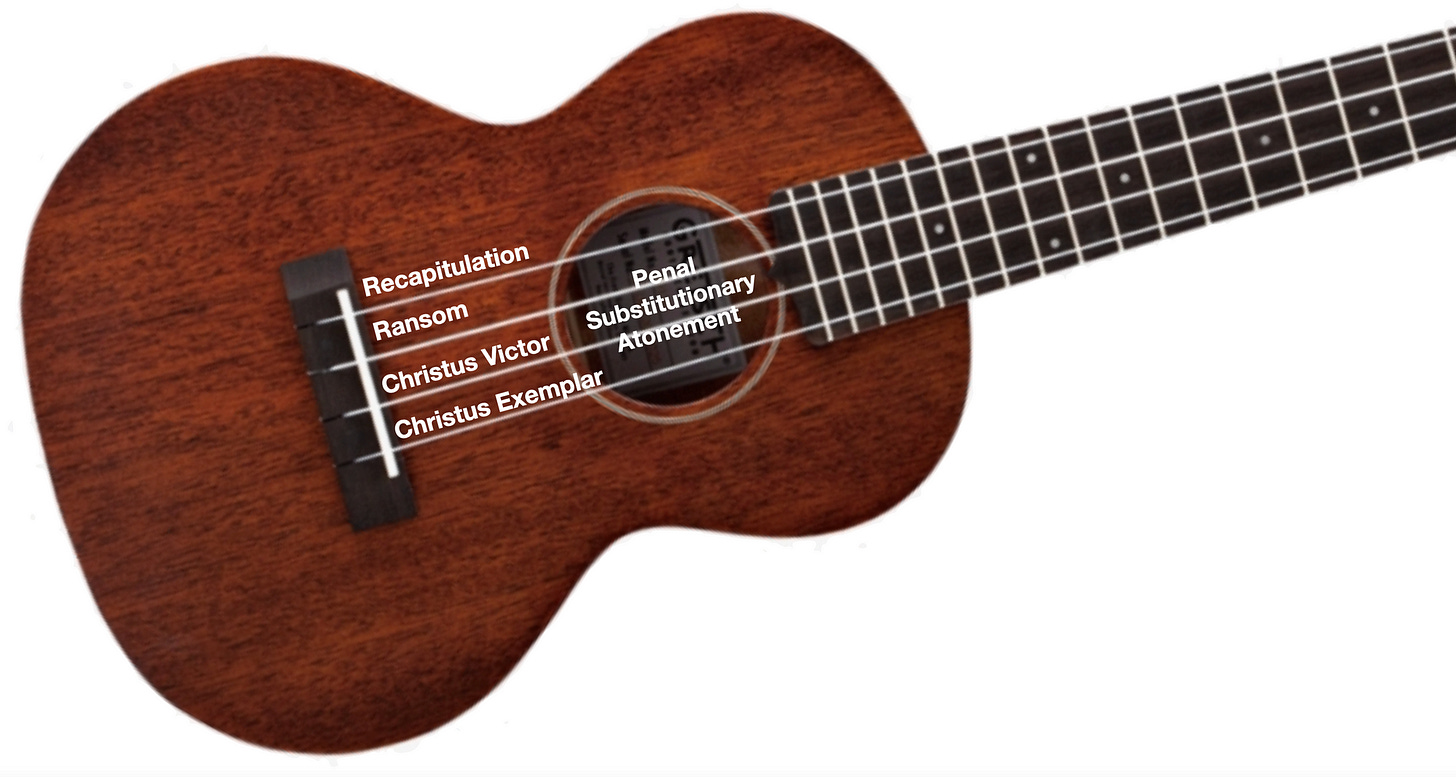
The Ukulele and the Cross
Jesus's death for our sins accomplished unfathomable riches of mercy and grace to be poured out upon us needy sinners. Theologians have wrestled with the various angles that describe what Jesus did for us on the cross. Some will even argue that there is only one way to describe and define what Jesus did for us on the cross. Rather than pick sides on the theological playground, I want to propose a harmony of notes that are played at the cross of Christ.
If theology is to be Christian, then it can only be a theology which understands in dynamic fashion the unsurpassable scandal of the Cross."
— Hans Urs von Balthasar
The 5 Themes of The Cross
Recapitulation: Jesus's death replays the life of Adam, but Jesus is obedient unto death, not disobedient to death, and it leads to life for us. (see Romans 5)
Ransom/Redemption: Some in church history taught this view as Christ's death being paid to Satan. There is no persuasive biblical case for that arrangement. However, Jesus does say in Mark 10:45 that he came to give himself as a ransom for many. So, how and why? By his death, Jesus is severing the sway of the devil and is now transferring people from the kingdom of darkness into the Kingdom of the Beloved Son. (see Ephesians 2:1–10 and Colossians 1:13–14)
Christus Victor: Jesus triumphed over sin, Satan, and death. Hallelujah! He is our champion and he gives us the victory. (see Colossians 2:13–15, Hebrews 2: 14–15, and 1 John 3:8)
Christus Exemplar: Christ's love, life, and sacrificial death is the example for our spirituality. When Jesus said, "Follow me," he meant every part of it. We learn forgiveness, turning from sin, serving and loving others, etc. from the way of Jesus. (see Philippians 2:5-11)
The cross must shape our spirituality, our vision, our values, our attitudes, our behavior, our goals, our ministry, what we fear, what we flee from, and what we try to be as individual Christians and as churches.” — Michael Bird
Penal Substitutionary Atonement: Christ's death was in our place and for our sins. His real blood was shed for our real sins. He paid it all for us; what we deserved—the wrath of the triune God—Jesus of Nazareth endured for us on the cross so that we can have forgiveness, freedom, and no condemnation for eternity. (see Isaiah 53, 1 Corinthians 15:1–4, 2 Corinthians 5, Galatians 3, and 1 Peter 2:24).
So how do all of these fit together? Like a ukulele.
Salvation's Strings
The strings on a ukulele, or guitar, need a resonator and a body for the sounds to be heard. And without the resonator, that large hole under the strings, the beautiful notes cannot be enjoyed.
Substitutionary atonement is the resonator and the wood body of the whole apparatus. Christ's as our substitute is what makes it plain and clear that he is the second Adam. Christ as our substitute is what makes him our victor, our champion. Christ is our example because he is our substitute from life to death—and life again. All the strings make a sound because of the resonator. And you need all the strings to play music.
Listen to all of these notes, and listen to them together to hear what Christ has done for you. Listen and respond in joy for what our Lord has done for us.












